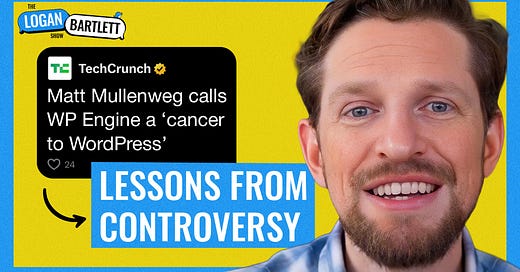Matt Mullenweg: WordPress Controversy, Future of Open Source AI, and Navigating Backlash
EP 130 of The Logan Bartlett Show: Untold stories from tech's inner circle
The recent controversy between WordPress and WP Engine put Matt Mullenweg (Co-Founder of WordPress, CEO of Automattic) under intense online scrutiny. In our conversation, he shared lessons from the controversy and managing through crisis, as well as his thoughts on the future of open source AI.
Click here to view the episode transcript | Watch on Youtube | Listen on Spotify or Apple Podcasts
✉️ Episode Memo
Lessons from handling the controversy, given he has been deeply involved in reading and responding to both negative and positive feedback online:
Reactions vary by platform. Sentiment analysis showed only 8% negative comments on Facebook and TikTok, while Twitter hit 48%. Different platforms shape conversations in distinct ways.
There’s a tradeoff between engaging with comments vs ignoring them. While Matt admires CEOs who can tune out criticism, he chooses to often respond, believing it’s a harder but more meaningful approach that helps him improve WordPress.
Criticism isn’t always personal. Many people project their frustrations about the world onto one person or the archetype they perceive the person to be.
Surrounding yourself with great people matters. Some of his best employees stay off social media entirely, focusing on building rather than discourse. He sees value in taking the public hits so his team can focus, but also in elevating others to tell the broader story.
Matt also shared his hopes and predictions for the future of open-source AI (given how quickly it has caught up with state-of-the-art proprietary models):
Open source will win in the long run, but it will take time. WordPress was very small for years before it gained momentum. Now, 21 years in, it powers 40% of websites. Early growth can be slow, but once a healthy open-source community hits a compounding flywheel, it becomes incredibly powerful.
Open source AI won’t fully replace proprietary models, but it will shape the market. While Matt doesn’t believe we’ll all default to open-source AI models, their presence will be a big part of the mix. More importantly, they put market pressure on proprietary players to be more open—just as Android pushed Apple to loosen some of its restrictions on charging cables.
Open source can be a strategic business move. Companies often invest in open source to commoditize what competitors monetize. For example, Meta is making its AI models more freely available to compete with Microsoft and OpenAI, and WordPress used the same strategy to compete with Movable Type in the early days.
⭐ Trailer
📱 Follow The Show!
If this was helpful to you, please consider forwarding!



